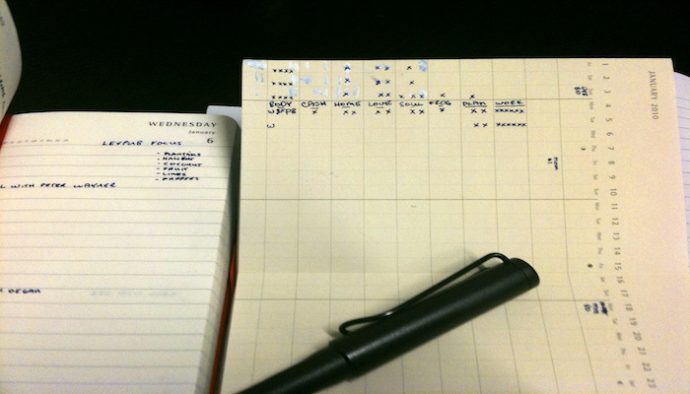You probably have a calendar. In fact, you probably have several calendars. Unless you’re of the type who puts endless sticky notes on every surface to remind you of things, you likely use that calendar to organize your appointments, priorities, and dates to remember.
For most of us, using a calendar is a necessity because of the amount of things we have going on at a given moment. If you’re a parent, compound that a few times because you’re not only keeping track of your stuff, but you’re keeping track of their stuff, too. Once upon a time parents looked forward to the day when a kid would turn 16 so they wouldn’t have to drive them to all their stuff any more; I suspect that we are getting close to the point when that sense of parental freedom comes when a child gets their own personal calendar rather than a driver’s license. That way they can keep up with all their stuff on their own.
Until then, though, many of us would be lost without these simple day trackers. We need them to tell us what we’ve committed to and where we should be. And for many of us, the calendar often seems to get out of control as we say “yes” to things we should be saying “no” to, all the while bemoaning the fact that there’s not enough time in the day.
Perhaps, though, taking control of your calendar isn’t just an issue of time management. Maybe there’s something deeper going on here. Maybe taking control of your calendar is actually a spiritual discipline; maybe it’s an act of discipleship. And here are three reasons why:
1. You should take control of your calendar because you are a steward of time.
When we think about stewardship, we think primarily about money. That’s a good and right thing; Jesus certainly taught us about about personal finance, setting up money the primary competitor to God in our lives (Matt. 6:24). At the same time, stewardship is not exclusively about money. Instead, it’s a holistic view of God as the owner, and we as His servants who have been entrusted with all kinds of resources, each of which provides an opportunity for the sake of the kingdom of God. Time is one of those resources.
Like money, we have been invested with a certain amount of time. Further, we don’t know how much time we have because it could be over tomorrow. In the meantime, though, we should take an active role in managing our calendars not only so that we can have time to make every appointment and meet every deadline, but because we are stewards of this resource and are responsible for using it in non-wasteful ways. Perhaps this is at least part of what it means when we ask the Lord to “Teach us to number our days carefully so that we may develop wisdom in our hearts” (Psalm 90:12).
2.You should take control of your calendar because you know your own limits.
In Romans 12, Paul told us that we ought that “everyone among you not to think of himself more highly than he should think” (Rom. 12:3). Instead, we should have a “sensible” or “sober” estimation of ourselves. In the context of Romans 12, Paul was addressing the church in which we might think more or less highly of our position and our gifting in the body of Christ. And yet the same principle applies here. When it comes to ourselves, we should have a sensible and reasonable estimation of what we’re capable of. One of the ways we reflect that is through taking control of our calendars.
We don’t over schedule ourselves because we know our own limits. Further, we don’t over schedule ourselves because if we do, we will be far more likely to succumb to temptation, trusting in other things besides the Lord for our comfort and sustainability. Having a sober estimation of ourselves means that we don’t have to play the hero in our daily lives; that’s a good thing because we already have a hero who doesn’t grow tired or weak, and He is even now advocating for us.
3.You should take control of your calendar because God has planned good works for you.
Paul wrote in Ephesians 2 that “you are saved by grace through faith, and this is not from yourselves; it is God’s gift— not from works, so that no one can boast” (Eph. 2:8-9). But he didn’t stop there. The next verse reminds us that we are being saved for something:
“For we are his workmanship, created in Christ Jesus for good works, which God prepared ahead of time for us to do.”
Whether you recognize it or not, God has planned good works for you today for you to walk in. That means in your regular pathway of going to work, having meetings, picking up kids, and everything else the Lord has sprinkled in opportunities for the sake of His kingdom. If we only had time for them.
If only.
We take control of our calendars because by faith, we believe that there will be opportunities today – and every day – for the gospel. Because we don’t know exactly what those are, we would do well to make sure that we build in some time to our days “just in case.” If we don’t build that time in then we are likely to see those opportunities as interruptions to an already crowded schedule rather than a chance to speak and demonstrate the gospel.
We do not know how much time we have, friends. But even though we don’t, we can still manage well what we do. In faith, manage your calendar. Make it serve the Lord, rather than serving it instead.
Subscribe to MichaelKelley.co
Never miss a new post. Subscribe to receive these posts in your inbox and to receive information about new discipleship resources.






1 Comment